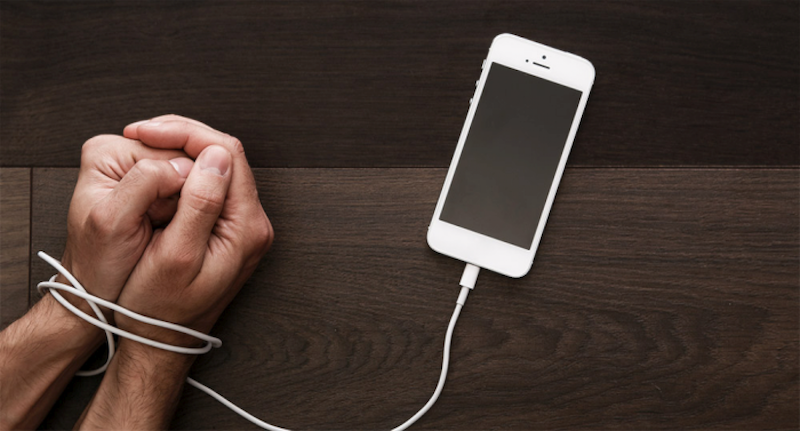Nomophobia refers to excessive anxiety at the thought of being separated from your gadget, of not being able to use it. This leads to avoidance strategies. It’s more than just an addiction. A mixture of English and Greek: “no mobile phone phobia” which contracted gives: Nomophobia. A word-of-the-year elected in 2018 by the Cambridge Dictionary committee. Yes, a word invented to describe the fear of living without your gadget.
Are we all a little nomophobic? Or dependent? What are the symptoms? The consequences? Keys and solutions to disconnect?
Concrete examples of nomophobia
A so-called nomophobe suffers from a real addiction to his gadget that turns into a phobia. The fear of being deprived of the use of his gadget…
This is betrayed by a panicked fear of:
- Losing or forgetting your phone
- Breaking your phone
- Getting your phone stolen
- No more battery
- Don’t have an internet network
- Not being able to use an application deemed essential
- This disproportionate anxiety is linked to the rise of new technologies. Alarmist? Non-preventive and informative
Although this disorder is not currently listed by the DSM-V (Diagnostic and Statistical Manual of Mental Disorders), it is considered by psychiatry researchers to be a disease of the modern world, caused by virtual communication.
This addiction to mobile devices is sometimes, especially in young subjects, correlated with personality disorders, or disorders such as obsessive-compulsive disorder or anxiety of social interaction.
All a little nomophobes? The study conducted by the UK Post Office in 2008 found that 53% of mobile device users had symptoms of anxiety in the event of loss, poor network coverage, or low battery.

Signs of smartphone addiction
It is time to admit, with difficulty, that one recognizes, or that one recognizes someone, among some of these manifestations, characteristics of addiction and dependence on the telephone:
Constant use and consultation of the telephone, on the street, at merchants, in transport, with friends, family, at work… to over-check their messages and social networks.
Fear panics with a feeling of suffocation when you can no longer find your device, think you are lost or broken when it is impossible to recharge it, to connect it. Need to have your gadget on you, feel it (in the pocket, hand, under the pillow….) Irrepressible desire to respond to text messages, emails, calls, comments in the immediate future, and sometimes, a withdrawal, “I was scared! I thought I had lost my gadget, but luckily it’s there! What stress, I have my whole life in it! who never uttered that sentence…”
Signs of nomophobia
In the case of nomophobia, we find of course the symptoms of addiction to the laptop mentioned above, to which will be added:
Phobias: The nomophobe will implement avoidance strategies to never be deprived of a mobile phone: always a charger or two on himself, he avoids places without a network or that “capture badly”, these behaviors will prevent him from getting involved in daily leisure.
A crisis of anxiety if she is deprived of her phone, with tremors, tachycardia, sweating, feeling suffocating and chest tightness, sensations of a lump in the throat and stomach, even nausea and vomiting, abdominal pain… It is called “trouble” if the patient feels pain, and loses control of the phone, and knows that he is unable to regulate himself. Nomophobia, therefore, is a disorder that will alter the daily life of the person who and can even represent a physical danger: impossible to resist the urge to send an SMS, while he is driving for example, or crossing the road.
The causes of nomophobia
The likelihood of being a nomophobe increases in an individual in high need for rewards. On the other hand, very sociable people have a lower risk of developing this addiction. Psychologist Carine Grzesiak explains that “Nomophobia is directly related to the strong development of information dependence and the immediacy of interactions via social networks.”
The arrival of smartphones has made it possible to be permanently connected to the world through the Internet and social networks. But what does this reveal?
What are the root causes of nomophobia?
For nomophobic people, the fear of being deprived of their smartphone symbolizes rather the fear of being isolated, cut off from the world. And a new phenomenon FOMO: the fear of missing something, which pushes us to compulsively check our Facebook news feed, notifications, emails, messages, WhatsApp, Instagram stories to be sure not to miss anything … FOMO, another new word, we explain everything.
Boredom can also be a possible cause of mobile phone addiction..
A leak from the “real world.” We realize that our family life, couple, our work is not what we had dreamed, projected. So we prefer to scroll (scroll mechanically with his thumb), send photos, videos, respond to comments that fill the head and mind, and prevent ruminating.
This addiction to mobile phones is sometimes, especially in young subjects, correlated with personality disorders, or disorders such as obsessive-compulsive disorder or anxiety of social interaction.
Difference between smartphone addiction and nomophobia
The two go hand in hand. Phone addiction can lead to nomophobia. How does this translate? By two criteria: the exaggerated anxiety at the idea of being deprived of the phone and avoidance strategies of your fears: you always have it on you, you check that you have it and you consider all the solutions of relief … As mentioned in the paragraph above.

What are the consequences if you are addicted or nomophobic?
Addiction is when there is a loss of control over the object. We can no longer be masters of the game. Obviously, this will impact our lives at all levels:
- Family sphere: loss of dialogue and moments spent together, each reclusive on his screen. There are many conflicts over screens.
- Love sphere: less interaction, sex life at half-mast, comparison to other couples on networks which creates frustration.
- Friendly sphere: less listening, less present, friends are annoyed to see you on their screen”not really being there”. Some addicts will prefer to stay at home, on their phone rather than accept an outing with friends. Addiction is then glaring and dangerous.
- Occupational or academic sphere: less effective at work, decreased attention, over-solicitation which can lead to forms of burn-out. An avalanche of notifications, emails, messages will create stress and push us to respond immediately. See our next article on the subject.
- Wellness sphere: anxious phone-related, reduced sleep, insidious fatigue, loss of self-confidence, passivity takes place.
The 18-25 age group remains the first target. Mobile device addiction shows the underlying fear of being isolated from the group. For many, being deprived of social networks or video games means social loss.
For dynamic young executives, nomophobia reveals rather the anxiety of professional performance that intimates them to be constantly reachable and responsive.
Treatment of addiction over the phone
Because yes, even if the term “addiction” seems exaggerated, many are in denial and refuse to admit to being addicted to the phone. We all think we have control over our phones, don’t we? If you are still on this page it is because you are wondering and looking for solutions. So are we.
Awareness: realizing that you are addicted is a giant leap. This is the step you have to go through and then act.
In case of mild addiction, it is possible to “wean” yourself. With a few tips, you’ll be given in another article.
The treatment of nomophobia
In the case of nomophobia, psychological management appears to be the most appropriate and appropriate care since work on phobias and causes will be carried out:
Cognitive-behavioral therapy (CBT) could be considered to help change the way you act, thus interacting differently, in a more measured way, with your mobile phone.
An IPT, interpersonal therapy, will also be adapted to re-create a bond, helping people in whom addiction to mobile phones generates isolation.
“Therapy needs to be adapted to the genesis of phobia,” says Dr. Neveux. He points out that some psychotherapies have been scientifically proven to treat many phobias, and are able to treat these phenomena of cell phone addiction.
Treating the symptoms of anxiety caused by nomophobia may also involve taking anxiolytics, which must be limited in time.
Plants, such as valerian and relaxation, meditation are real alternatives to anxiolytics in the treatment of anxieties. It is essential to seek advice from your doctor or pharmacist.
Preventing nomophobia
Preventing nomophobia is primarily about the moderate use of screens from an early age and education with limits.
The prevention of nomophobia may involve knowledge of personality traits
Those at risk include specific personality traits:
- The attraction for new situations
- Important Imagination
- impulsiveness
- Tendency to depression
- Extroverted personality
These are factors that can lead to nomophobia.






